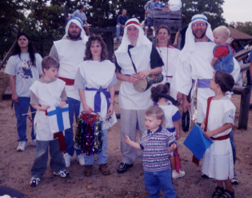|
|
|
| TESHUVAH: A Special Season of Repentance By Stephen Zimmerman As we approach the "High Holy Days" of the Biblical calendar, which include the most solemn Day of Atonement, we are in a special preparatory time on which we traditionally blow the shofar every day to remind ourselves that they are drawing near. This month of soul-searching parallels the prophetic time in which we are now living, which is a prelude to the drastic upheavals which will signal the beginning of the end of the age and the Messianic Kingdom. The "beginning of birth pangs" alert us to wake up and "lift up your heads, for your redemption draws near!" There are two "days of judgment" on Yahweh's annual calendar. The first is the Feast of Trumpet-blasts (Yom haTeruah) the first day of the civil year, but also considered in some aspects the end of the prior year., because of the concept of overlap in Hebraic thought. "Rosh haShanah" (as Yom haTeruah is often called) is when the court (of 24 elders) is seated and "the books are opened" (Dan. 7:9; Rev. 4:1). The first book opened is the "Book of the Righteous", or, the Book of Life. The second is for another clear-cut category, the "wicked", with whom YHWH has stopped striving. But the third book is less conclusive. It is called the "Book of the Sinners", and refers to the average people who may be sinning in ignorance. It is necessary in Scripture to distinguish between "the wicked" and "sinners". Y'shua said He was "betrayed into the hands of sinners" (Matt. 26:45), and He forgave them, for were not sinning deliberately. In the Torah, only deliberate sins were punished by death; those done ignorantly could be atoned for by a sacrifice. Hebrews 10:26 reminds us that for those who go on sinning willfully after receiving the knowledge of the truth, there no longer remains a sacrifice for sins. David says he will "teach sinners [Yahweh's] ways" (Ps. 51:13), so there is yet hope for them as long as the gates have not yet been closed. The second day of judgment, ten days later, is Yom Kippur. On this day, there was a great ceremony in Jerusalem of closing the gates to the temple. The 40 days before Yom Kippur, but especially the last 10, are spent in fervent repentance. During this period Jews typically greet each other with "may you be sealed for the day of redemption", and pray to the same end. Ephesians 4:30 tells us that the Holy Spirit assures us that we are sealed for that day, through faith in the Messiah (cf. 1:13-14). The seal also reminds us of the mark placed upon Cain to prevent him from being judged by anyone but Yahweh, and that mark (and its counterfeit) show up again in Ezekiel and Revelation. However, there are various levels of reward within the Kingdom, and our attitude at Yom Kippur especially sets the tone spiritually for the doors that will be opened for us in the following year. We fast on Yom Kippur to "afflict our souls" (suppress our wills and appetites), because they are "gates" by which sin gains entrance. (Gen. 4:7) Therefore, we close them up on the day when Yahweh renders His verdict on the spiritual health of the nation of Israel as a whole. YHWH prescribed a curious practice in Leviticus 13:21, 33 for dealing with people who had leprosy: if the verdict was still unclear, they were given a 7-day waiting period. Why 7? Because it relates to the judgment scenario mentioned above: after Yahshua comes for those who have believed "on time", there are 7 years of sifting, when many, who are judged to be wicked, are destroyed outright. But the Two Witnesses and 144,000 Israelite "evangelists" give the undecided one last opening to repent. But this is to their shame. The ten virgins who were not ready when the bridegroom have missed the wedding itself, however, unlike the five who were ready. (Mat. 25) The fruitless tree that was given extra care and more time (Lk. 13) also shows that Yahweh is not quick to judge. But why require Him to give us "days of grace"? Why not be found not only ready but eager to "pay the rent on time" and be people whom He not only allows into the Kingdom, but welcomes with open arms and designs special positions for? Remember, Yahshua is coming "for those who love His appearing". |
 |
|
Links to Other Sites |
|